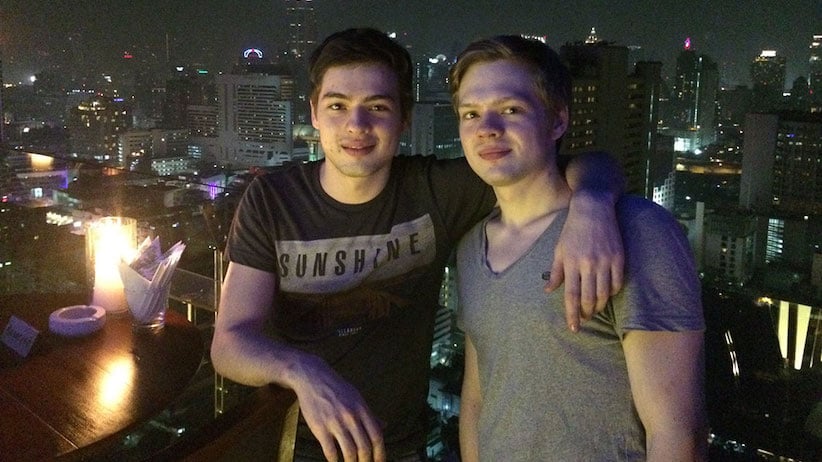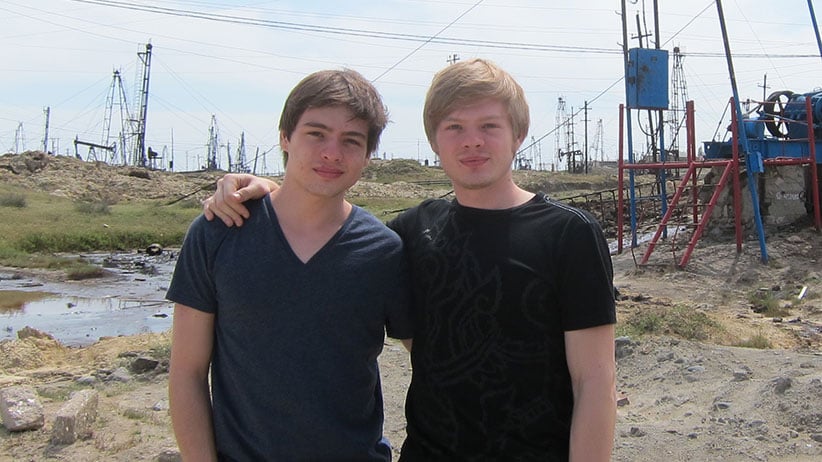Two sons of KGB spies will soon learn if Canada’s top court will hear their appeal to remain Canadian citizens
With the Supreme Court about to announce if it will hear their case, here’s everything you need to know about the strange saga of the Vavilov brothers
Alex and Tim in Bangkok in 2011. (Tim and Alex Vavilov)
Share

The Vavilov brothers—born in Toronto, but famously stripped of Canadian citizenship after their parents were exposed as elite Russian spies living in the West under stolen identities—are back in the headlines this week. Yet another judge has rendered yet another ruling in the brothers’ epic legal battle to regain their lost citizenship. This time it was Timothy, the eldest sibling, convincing the Federal Court that Ottawa was indeed wrong to revoke his status.
The Supreme Court will have what should be the final say in the coming days. On May 10, the high court is expected to announce whether it will hear one last appeal in the stranger-than-fiction saga—declaring, once and for all, whether the children of deep-cover KGB officers qualify as Canadians.
Read: The full story of the Canadian-born sons of Russian spies
The brothers’ sensational life story—which helped inspire the acclaimed FX television series The Americans, now in its final season—was the subject of a recent Maclean’s cover article that revealed exclusive new details about their mom and dad’s secret double life in Canada. As the Supreme Court prepares to write the next chapter, here is what you need to know.
Who are Timothy and Alexander Vavilov?
Born at Women’s College Hospital in Toronto (Tim on June 27, 1990, Alex on June 3, 1994), their original names—as registered on their Ontario birth certificates—were Timothy Andrew Foley and Alexander Philip Anthony Foley. Growing up Canadian, the boys had no idea their surname was a fraud, or that that their mother and father were not the Canucks they claimed to be.
Who are their parents?
Their real names are Andrey Bezrukov and Elena Vavilova, a husband-and-wife team of Soviet-era KGB “illegals” deployed overseas during the Cold War. After slipping into Canada sometime in the late-1980s (the exact date is still a mystery), the couple assumed the stolen identities of two dead babies from Montreal: Donald Howard Heathfield and Tracey Lee Ann Foley. (The KGB was notorious for sifting through foreign cemeteries and newspaper obituaries, on the hunt for potential aliases.) “Don” and “Tracey” spent the next two decades entrenched in the West, using coded radio transmissions and encrypted computer messages to communicate with their Moscow handlers. As part of his cover, Don even opened his own company in Mississauga: a diaper-delivery service. When their sons were still young, the couple moved to France, then to Boston, where the pair was ultimately busted in 2010 as part of a sweeping FBI investigation that rounded up 10 so-called illegals.
What happened to the brothers after the bust?
Tim was 20 when heavily armed federal agents stormed their Massachusetts home; Alex was 16. “I was shocked in ways words cannot describe,” Tim later wrote, in a sworn affidavit. The brothers eventually flew to Russia, where officials revealed the truth about their mom and dad; days later, after Washington and Moscow orchestrated an historic spy swap, the family was reunited. “My parents live their lives like everyone else, making choices along the way,” Alex told Maclean’s last year. “It was quickly apparent to me that the reason they chose to engage in their work was out of a sense of patriotism. They deeply cared about the welfare of their countrymen and the fate of their homeland, and still do.”
Were Tim and Alex truly oblivious to the fact that their parents were Russian spies?
That’s correct, they insist. But plenty of doubt lingers, even eight years later. Although authorities have never suggested that Alex knew anything about his mother and father’s true identities, the same can’t said for his older brother. After the bust, reporters asked Richard DesLauriers, then the special agent in charge of the FBI’s Boston office, if Tim had any inkling. “It’s logical to presume, and we suspect he knew something toward the end, before their arrests,” DesLauriers replied. Two years later, The Wall Street Journal reported that Tim not only knew the truth but had pledged to join his parents in the world of espionage—agreeing to travel to their homeland to begin formal training. During one conversation with his parents, the article alleged, Tim “stood up and saluted ‘Mother Russia.’ ” The most damning allegation comes courtesy of Canada’s spy agency, the Canadian Security Intelligence Service (CSIS). According to a report prepared by a senior immigration official, CSIS has informed the federal government that Tim was “sworn in” by the SVR, the KGB’s post-Soviet successor, before his parents were exposed.
Tim now works in Asia; he has never been charged, and adamantly denies any involvement. “I am aware that there have been some media reports that my parents were ‘grooming’ me for espionage,” he wrote in his affidavit, filed as part of the ongoing citizenship proceedings. “These allegations are not true. It has been stated by the FBI that for over 10 years my home was bugged, however no evidence of my involvement has ever been presented.”
The brothers were born on Canadian soil. How can the government strip them of citizenship, a supposed birthright?
This is the key question. After the FBI operation triggered headlines around the world, the spies’ sons—now 27 and 23—were granted Russian citizenship; they also changed their last name to Vavilov. In the meantime, immigration officials in Ottawa concluded that both brothers were never Canadian to begin with, despite being born here, because their parents were “employees in Canada of a foreign government,” a rare exception to the birthright rule under the Citizenship Act. Like their mom and dad, they were suddenly banished from Canada.
Despite all the intrigue surrounding their story—and all the suspicion that continues to swirl around Tim—the brothers’ parallel court challenges hinge on a granular question of law: the definition of “employee of a foreign government,” as outlined in section 3(2)(a) of the Act. Ottawa contends (and the Federal Court agreed, in a 2015 ruling in Alex’s case) that the clause means exactly what it says: any employee of a foreign government, including a deep-cover Russian spy. But the Vavilovs argue that the clause is limited to only those employees who enjoy diplomatic privileges, such as an ambassador. The sole purpose of the law, they say, is to ensure that a child born to a visiting diplomat is not granted both Canadian citizenship and state immunity. Because their parents were undercover spies who had no affiliation with the Russian embassy in Ottawa—and therefore didn’t enjoy any form of immunity—Tim and Alex insist the clause does not apply to them.
Last June, the Federal Court of Appeal agreed with that interpretation, ruling 2-1 to overturn the 2015 judgment and reinstate Alex’s citizenship. Armed with that precedent-setting ruling, Tim convinced a Federal Court judge last week that his citizenship should not have been cancelled, either.

What now?
Last September, the Trudeau government sought leave to appeal Alex’s ruling to the Supreme Court, arguing that the case raises important questions about “the integrity of Canadian citizenship” and “who is entitled to it.” Although the high court has yet to make an official announcement, lawyers for both sides have been informed that the Supreme Court will decide on May 10 whether to weigh in. If the judges decline to intervene, Alex will keep his newly reinstated citizenship—and Ottawa will have no choice but to restore Tim’s status, too. If the court grants leave to appeal, a hearing will be scheduled in the coming months to finally decide whether the two men are Canadian. Alex is here now, awaiting the outcome; in January, a judge said he should be allowed to return to his birth country pending the Supreme Court’s decision.
Is Ottawa determined to punish the brothers for the sins of their parents?
They certainly think so. “I have done nothing to warrant the harsh treatment and exile I have received,” Alex told Maclean’s. “Whether or not the government decides to reissue my citizenship, I will always be Canadian at heart. I have grown up that way and believe it to be my only identity. It is something I would fight to the end to retain. I am confident that the law is on my side, because I know I haven’t done anything wrong.” In his affidavit, Tim accuses the federal government of “stretching the written law beyond its meaning” in an attempt “to tarnish our lives” for political purposes. “I am first and foremost Canadian,” he continues. “I have lived for 20 years believing that I was Canadian and I still believe I am Canadian. Nothing can change that.”
The real Donald Heathfield and the real Tracey Foley died in 1962. What do their families think of this bizarre case?
Both were shocked to find out that Russian intelligence operatives had stolen the names and birthdays of their dead loved ones—and they have little sympathy for Tim and Alex in their fight to regain Canadian citizenship. “They should both be left in Russia,” says David Heathfield, Donald’s older brother. Pauline Foley, Tracey’s mother, says if the sons are declared Canadian once again, she would appreciate the chance to meet them face-to-face. “I would like them to know what affect this has had on the two families, because of what their parents have done,” she says.
Where are the former spies now?
Bezrukov is now a senior adviser at Rosneft, a major Russian oil company, and also a university professor who writes and lectures on U.S. public policy. He is still married to Vavilova, who works as an adviser at Moscow-based Norilsk Nickel. The couple is helping to pay their sons’ legal bills. “We have spent a substantial sum, but have no regrets,” Alex says.
Does the family watch The Americans, the hit series inspired by the same FBI bust that upended their former lives?
Yes. In a 2015 interview with a Russian reporter, Bezrukov said the show “looks pretty much like reality, but of course without the murders and the wigs…The creators of the series succeeded in showing both the atmosphere and the internal feelings of the illegals, as well as the difficulties, including the personal ones, that you have to deal with.” Alex said watching the show can be “very odd” at times. “In particular, during the calm everyday scenes, I start to reflect about my own childhood experiences and my parent’s reasons for choosing the career they did,” he said. “Of course, when they show murders and life and death circumstances, I am reminded again of Hollywood’s insatiable desire for action and suspense.”